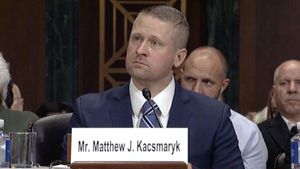Treatment GuideJust DiagnosedSex & DatingAfrican AmericanStigmaAsk the HIV DocPrEP En EspañolNewsVoicesPrint IssueVideoOut 100
CONTACTCAREER OPPORTUNITIESADVERTISE WITH USPRIVACY POLICYPRIVACY PREFERENCESTERMS OF USELEGAL NOTICE
© 2026 Pride Publishing Inc.
All Rights reserved
All Rights reserved
By continuing to use our site, you agree to our Privacy Policy and Terms of Use.
A number of states have tied Medicaid coverage to work requirements. But legal challenges have followed — a sucessful attempt to stop the program in Kentucky, an ongoing lawsuit in Arkansas and possibly more to come.
The first substantive arguments were filed last week in a lawsuit against Arkansas' Medicaid waiver program. The state has removed thousands of people from its Medicaid program since June, when it began requiring some participants to work 80 hours a month.
Leonardo Cuello is with the National Health Law Program, one of the groups challenging that policy. Federal law allows states to experiment with their Medicaid programs to improve health care, but Cuello said changes like work requirements create more problems.
“They don’t actually furnish care for anyone, they actually do the exact opposite," Cuello said. "They take care away from people.”
A federal judge agreed when he put Kentucky’s Medicaid waiver program on hold in June just days before it was scheduled to go into effect, the result of a lawsuit that Cuello's organization was involved in. Kentucky's program is still under review.
Indiana, Wisconsin and New Hampshire have also been given government approval to implement work requirements. Cuello said his organization is watching closely.
“We are, as always when seeing things that are legally troubling, considering the possibility of taking legal action,” Cuello said. “It’s impossible to predict whether a lawsuit will be filed by us or by anybody else, but given the legally problematic things they are doing and the great potential harm to people in the state, it seems very possible that litigation could happen.”
Indiana plans to gradually roll out its work requirement next year for some enrolled in the Healthy Indiana Plan (HIP), the state's expanded Medicaid program.
A government spokesman said Indiana is confident its program is structured to avoid a legal challenge.
"We recognize that communication is key and will continue to focus on member education throughout the phase in of the program starting in 2019," spokesman Jim Gavin wrote in an email. "We are also actively seeking partners across the state to help connect HIP members to opportunities to work, further their education or serve their communities."
This story was produced by Side Effects Public Media, a news collaborative covering public health.
From our Sponsors
Most Popular
“So much life to live”: Eric Nieves on thriving with HIV
September 03 2025 11:37 AM
The Talk: Beyond the exam room
August 13 2025 3:15 PM
Messenger RNA could be the key to an HIV vaccine — but government cuts pose a threat
August 20 2025 8:02 AM
Thanks to U=U, HIV-positive people can live long, happy, healthy lives
July 25 2025 2:37 PM
It’s National PrEP Day! Learn the latest about HIV prevention
October 10 2025 9:00 AM
Amazing People of 2025: Javier Muñoz
October 17 2025 7:35 PM
The Talk: Starting the conversation
July 25 2025 4:47 PM
The lab coat just got queer
August 21 2025 10:00 AM
The Talk: Owning your voice
August 25 2025 8:16 PM
“I am the steward of my ship”: John Gibson rewrites his HIV narrative
September 16 2025 2:56 PM
Plus: Featured Video
Latest Stories
HIV-positive men stage 'Kiss-In' protest at U.S.-Mexico border
December 01 2025 12:56 PM
What the AIDS crisis stole from Black gay men
December 01 2025 6:00 AM
The Talk: Navigating your treatment
August 01 2025 6:02 PM
How the Black AIDS Institute continues to fill in the gaps
July 25 2025 1:06 PM
“I felt like a butterfly”: Niko Flowers on reclaiming life with HIV
July 23 2025 12:22 PM
Dancer. Healer. Survivor. DéShaun Armbrister is all of the above
July 02 2025 8:23 PM
BREAKING: Supreme Court rules to save free access to preventive care, including PrEP
June 27 2025 10:32 AM
1985: the year the AIDS crisis finally broke through the silence
June 26 2025 11:24 AM
VIDEO: A man living with HIV discusses his journey to fatherhood
June 10 2025 4:58 PM
Trump admin guts $258 million in funding for HIV vaccine research
June 03 2025 3:47 PM
Grindr is reminding us why jockstraps are so sexy and iconic
May 02 2025 5:36 PM
HRC holds 'die-in' to protest Trump health care cuts
April 28 2025 2:11 PM
Two right-wing Supreme Court justices signal they may uphold access to PrEP and more
April 21 2025 4:10 PM
500,000 Children at Risk: PEPFAR Funding Crisis
April 08 2025 3:51 PM
Broadway's best raise over $1 million for LGBTQ+ and HIV causes
April 03 2025 7:15 PM
The Talk Season 5 premieres this spring with HIV guidance for the newly diagnosed
March 26 2025 1:00 PM








































































